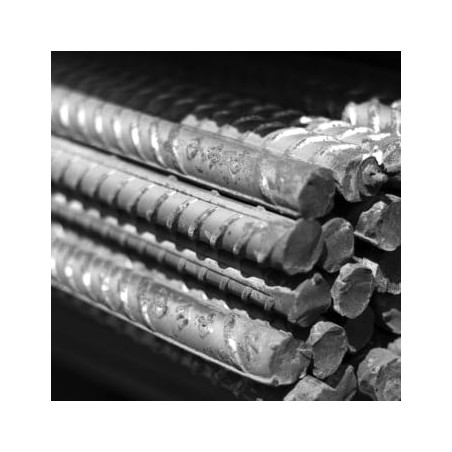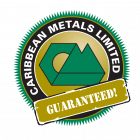

Rebar (short for reinforcing bar), known when massed as reinforcing steel or reinforcement steel, is a steel bar or mesh of steel wires used as a tension device in reinforced concrete and reinforced masonry structures to strengthen and aid the concrete under tension. Concrete is strong under compression, but has weak tensile strength. Rebar significantly increases the tensile strength of the structure. Rebar's surface is often "deformed" with ribs, lugs or indentations to promote a better bond with the concrete and reduce the risk of slippage.
The most common type of rebar is carbon steel, typically consisting of hot-rolled round bars with deformation patterns. Other readily available types include stainless steel, and composite bars made of glass fiber, carbon fiber, or basalt fiber. The steel reinforcing bars may also be coated in an epoxy resin designed to resist the effects of corrosion mostly in saltwater environments, but also land based constructions. Bamboo has been shown to be a viable alternative to reinforcing steel in concrete construction. These alternate types tend to be more expensive or may have lesser mechanical properties and are thus more often used in specialty construction where their physical characteristics fulfill a specific performance requirement that carbon steel does not provide. Steel and concrete have similar coefficients of thermal expansion, so a concrete structural member reinforced with steel will experience minimal differential stress as the temperature changes.
ASTM A615 covers deformed and plain carbon steel bars for concrete reinforcement. This specification covers bars and coils in four grades, Grade 40, Grade 60, Grade 75, and Grade 80. The grade designates the yield strength of the material, i.e. Grade 60 has a 60ksi minimum yield.
ASTM A706 covers deformed and plain low alloy steel bars for concrete reinforcement with restrictive mechanical properties and chemical composition in order to enhance weldability. This specification covers bars and coils in two grades, Grade 60 and Grade 80. The grade designates the yield strength of the material, i.e. Grade 60 has a 60ksi minimum yield.
In addition to the above chemical requirements, A706 rebar must also have a carbon equivalent (CE) not exceeding 0.55%.
The way to calculate this is to plug the chemical composition figures for a given heat lot of steel into the following formula:
CE = %C + (%Mn / 6) + (%Cu / 40) + (%Ni / 20) + (%Cr / 10) – (%Mo / 50) – (%V / 10)
Rebar produced to this specification shall be marked with the letter “W” to indicate weldability.
ASTM A615 covers deformed and plain carbon steel bars for concrete reinforcement. This specification covers bars and coils in four grades, Grade 40, Grade 60, Grade 75, and Grade 80. The grade designates the yield strength of the material, i.e. Grade 60 has a 60ksi minimum yield.
In certain cases, such as earthquake engineering and blast resistant design where post-yield behavior is expected, it is important to be able to predict and control properties such as the maximum yield strength and minimum ratio of tensile strength to yield strength. ASTM A706 Gr. 60 is an example of a controlled property range material specification which has a minimum yield strength of 60 ksi (420 MPa), maximum yield strength of 78 ksi (540 MPa), minimum tensile strength of 80 ksi (550 MPa) and not less than 1.25 times the actual yield strength, and minimum elongation requirements that vary by bar size.
ASTM marking designations are:
'S' billet A615
'I' rail A616 "ASTM A616 / A616M - 96a Standard Specification for Rail Steel Deformed and Plain Bars for Concrete Reinforcement (Withdrawn 1999, superseded by A996)". Astm.org. Retrieved 2012-08-24.)
'IR' Rail Meeting Supplementary Requirements S1 A616 "ASTM A616 / A616M - 96a Standard Specification for Rail Steel Deformed and Plain Bars for Concrete Reinforcement (Withdrawn 1999, superseded by A996)". Astm.org. Retrieved 2012-08-24.)
'A' Axle A617 "ASTM A617 / A617M - 96a Standard Specification for Axle Steel Deformed and Plain Bars for Concrete Reinforcement (Withdrawn 1999, superseded by A996)". Astm.org. Retrieved 2012-08-24.)
'W' Low-alloy — A706
| A615 Designation Numbers | |
| Bar No. | Nominal Diameter |
| 3 | 0.375” |
| 4 | 0.500” |
| 5 | 0.625” |
| 6 | 0.750” |
| 7 | 0.875” |
| 8 | 1.000” |
| 9 | 1.128” |
| 10 | 1.270” |
| 11 | 1.410” |
| 14 | 1.693” |
| 18 | 2.257” |
| A615 Mechanical Requirements | ||||
| Grade 40 | Grade 60 | Grade 75 | Grade 80 | |
| Tensile, ksi | 60 | 90 | 100 | 105 |
| Yield, ksi | 40 | 60 | 75 | 80 |
| Elongation in 8” | ||||
| Bar size #3 | 11 | 9 | 7 | 7 |
| 4,5,6 | 12 | 9 | 7 | 7 |
| 7,8 | 8 | 7 | 7 | |
| 9 thru 18 | 7 | 6 | 6 | |
| A615 Mechanical Requirements | ||||
| Grade 40 | Grade 60 | Grade 75 | Grade 80 | |
| Tensile, ksi | 60 | 90 | 100 | 105 |
| Yield, ksi | 40 | 60 | 75 | 80 |
| Elongation in 8” | ||||
| Bar size #3 | 11 | 9 | 7 | 7 |
| 4,5,6 | 12 | 9 | 7 | 7 |
| 7,8 | 8 | 7 | 7 | |
| 9 thru 18 | 7 | 6 | 6 | |
| A706 Mechanical Requirements | ||
| Grade 60 | Grade 80 | |
| Tensile, ksi | 80 | 100 |
| Yield, ksi | 60-78 | 80-98 |
| Elongation in 8” | ||
| Bar size #3,4,5,6 | 14 | 12 |
| 7,8,9,10,11 | 12 | 12 |
| 14,18 | 10 | 10 |
| *Tensile strength shall not be less than 1.25 times the actual yield strength | ||
| A706 Designation Numbers | |
| Bar No. | Nominal Diameter |
| 3 | 0.375” |
| 4 | 0.500” |
| 5 | 0.625” |
| 6 | 0.750” |
| 7 | 0.875” |
| 8 | 1.000” |
| 9 | 1.128” |
| 10 | 1.270” |
| 11 | 1.410” |
| 14 | 1.693” |
| 18 | 2.257” |
| A706 Chemical Requirements | |
| Element | Max % |
| Carbon | 0.3 |
| Manganese | 1.5 |
| Phosphorous | 0.035 |
| Sulfur | 0.045 |
| Silicon | 0.5 |
What is the difference between A615 and A706 rebar?
Conventional reinforcing steel is used in the majority of reinforced concrete structures. ... Results from this study indicate that ASTM A706 reinforcing steel exhibits lower critical chloride threshold levels and higher corrosion rates than ASTM A615 reinforcing steel when embedded in cementitious materials.
What is difference between grade 40 and grade 60 steel?
Grade 40 means steel having yield strength of 40Ksi and grade 60 means steel having yield strength of 60 Ksi. So grade 60 is stronger than grade 40. The difference is yield strength 40kpsi versus 60kpsi.
Is A706 rebar weldable?
ASTM A706 rebar is a specification given to low-alloy reinforcing bars in either standard lengths or coiled configurations. ... A706 rebar is a weldable rebar and especially recommended for capacity-protected structures, and it is commonly used in: Bent caps.


